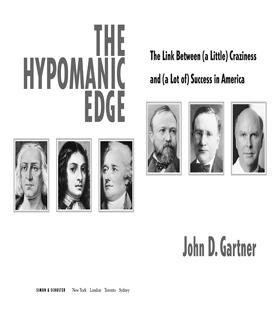


SIMON & SCHUSTER
Rockefeller Center
1230 Avenue of the Americas
New York, NY 10020
www.SimonandSchuster.com
Copyright 2005 by John D. Gartner
All rights reserved, including the right of reproduction in whole or in part in any form.
Illustration credits appear on page 355.
SIMON & SCHUSTER and colophon are registered trademarks of Simon & Schuster, Inc.
For information about special discounts for bulk purchases, please contact Simon & Schuster Special Sales at 1-800-456-6798 or business@simonandschuster.com
Designed by Jeanette Olender
Manufactured in the United States of America
10 9 8 7 6 5 4 3 2 1
Library of Congress Cataloging-in-Publication Data
Gartner, John D.
The hypomanic edge: the bipolar disorder that made America the most successful nation in the world/John D. Gartner.
p. cm.
Includes bibliographical references and index.
1. HypomaniaUnited StatesHistory.
2. HypomaniaPatientsUnited StatesBiography. I. Title.
RC516.G376 2005
62.19689500922dc23 2004062624
ISBN 0-7432-4344-7
ISBN-13: 978-0-743-24344-5
eISBN-13: 978-1-439-10773-7
FOR DAD
Contents
Introduction The Hypomanic American
THE HYPOMANIC ENTREPRENEUR
The 1990s will be remembered as the age of Internet mania, a time when entrepreneurs making grandiose claims for their hightech companies swept up millions of Americans with their irrational exuberance, inflating the biggest speculative bubble in history. The idea that some entrepreneurs may be a little manic is hardly new. A Google search for manic and businessman yields more than a million hits. Entrepreneurs, as well as the markets they energized, were commonly described in the media as manic. Yet, until now, there has never been a serious suggestion that the talent for being an entrepreneur and mania, the genetically based psychiatric disorder, are actually linked. Perhaps because I am a clinical psychologist, it was clear to me that manic was more than a figure of speech in this case.
I called several reporters who had written profiles of these manic entrepreneurs and asked them, Do you think he really was manic? None said yes. Not really manic; not clinically, was a typical response. They resisted applying the psychiatric diagnosis because the entrepreneurs they had interviewed were boastful, hyperenergized, and zany, but they werent crazy. And the journalists were right. Their subjects were not manic. They were hypomanic. Hypomania is a mild form of mania, often found in the relatives of manic depressives. Hypomanics are brimming with infectious energy, irrational confidence, and really big ideas. They think, talk, move, and make decisions quickly. Anyone who slows them down with questions just doesnt get it. Hypomanics are not crazy, but normal is not the first word that comes to mind when describing them. Hypomanics live on the edge, betweeen normal and abnormal.
For example, Jim Clark, cofounder of Netscape, was described in Business Week by Netscapes other cofounder, Jim Barksdale, as a maniac who has his mania only partly under control.
Successful entrepreneurs are not just braggarts. They are highly creative people who quickly generate a tremendous number of ideassome clever, others ridiculous. Their flight of ideas, jumping from topic to topic in a rapid energized way, is a sign of hypomania. Consider Bill Gross, CEO of Idealab. Bill Grosss job was not to build or run companies, but just to think of ideas for them. Idealab was an Internet incubator. On Fortunes cover, next to a picture of a cheerful Bill Gross, was the caption I Lost $800 Million in Eight Months. Why Am I Still Smiling? The author, Joseph Nocera, Fortunes managing editor, begins his article with an unusual mea culpa. He apologizes to his readers for his previous Fortune article that hyped Gross and Idealab just before the Nasdaq crash. He confesses that Gross converted him into a believer:
I believed him because I was dazzled by him. A small, wiry man, Gross had an infectious boyish enthusiasm that was charming and irresistible. He spoke so rapidlyjumping from topic to topic as if he were hyperlinkingthat it was hard to keep up with him, and had so much energy he seemed constantly on the verge of jumping out of his skin. He bubbled over with irrepressible optimism.
And his brain! Thats what really set him apart. You could practically see the ideas bursting out of it, one after another, each more offbeat, more original, more promising than the last. The sheer profusion of ideasand the way he got excited as he described themwas a large part of his charisma.
The reason Bill Gross was still smiling was that his newest new idea was going to be unbelievably huge and revolutionize the Internet. Eight hundred million. Eight hundred shmillion. Nothing could dim Grosss enthusiastic confidence.
During the 1990s, I was paying attention to such behavior because I was planning to write a book about religious movements started by manic prophets. But I began to be distracted by messianic movements happening around me in real time, particularly because, as an avid technology investor, I was a member of onethe believers in the new economy. I was even a millionaire on paper for one exhilarating day in March 2000 at the peak of the market, before my portfolio lost 90 percent of its value. I began to suspect I was writing the wrong book.
My new hypothesis became that American entrepreneurs are largely hypomanic. I decided to undertake what social scientists call a pilot study: a small-scale, inexpensive, informal investigation meant to test the waters. I placed announcements on several Web sites devoted to the technology business, expressing my interest in studying entrepreneurs and requesting volunteers. I interviewed a small sample of ten Internet CEOs. After I read them each a list of hypomanic traits that I had synthesized from the psychiatric literature, I asked them if they agreed that these traits are typical of an entrepreneur:
He is filled with energy.
He is flooded with ideas.
He is driven, restless, and unable to keep still.
He channels his energy into the achievement of wildly grand ambitions.
He often works on little sleep.
He feels brilliant, special, chosen, perhaps even destined to change the world.
He can be euphoric.
He becomes easily irritated by minor obstacles.
He is a risk taker.
He overspends in both his business and personal life.
He acts out sexually.
He sometimes acts impulsively, with poor judgment, in ways that can have painful consequences.
He is fast-talking.
He is witty and gregarious.
His confidence can make him charismatic and persuasive.
He is also prone to making enemies and feels he is persecuted by those who do not accept his vision and mission.
I feared they might find the questions insulting. I neednt have worried. All of the entrepreneurs agreed that the overall description was accurate, and they endorsed all the hypomanic traits, with the exceptions of paranoia and sexual acting out (these traits in particular are viewed as very negative and thus may be more difficult to admit to). Most expressed their agreement with excitement: Wow, thats right on target! When I asked them to rate their level of agreement for each trait on a standard 5-point scale, many gave ratings that were literally off the chart: 5+s, 6s. One subject repeatedly begged me to let him give a 7. I was startled by the respondents enthusiasm, though perhaps I shouldnt have been. As a psychotherapist, I am familiar with the way people become energized when they feel understood, especially when it helps them understand themselves better.
Next page








